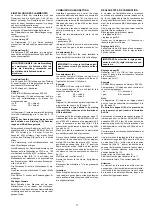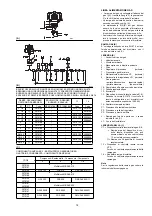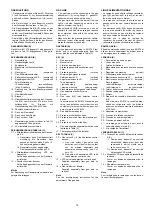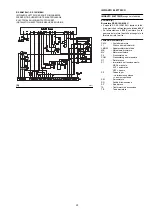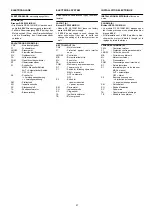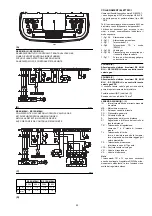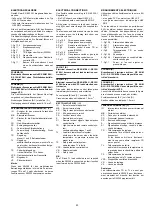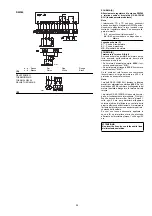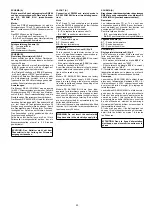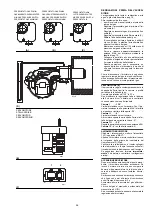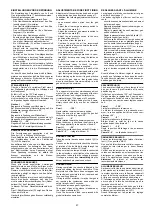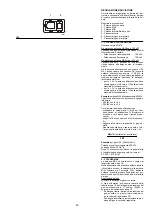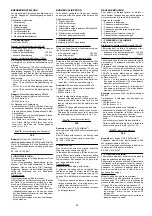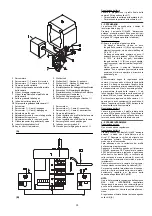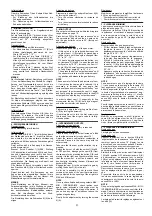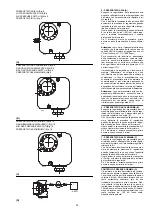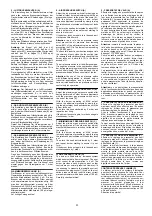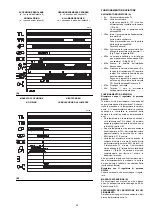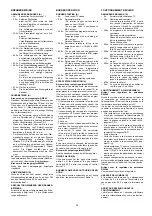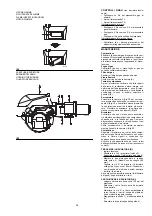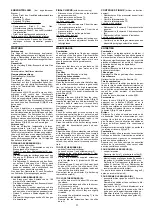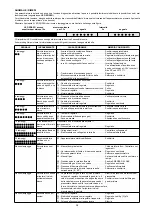
31
Adjusting air delivery
Progressively adjust the end profile of cam 4)(A)
by turning the screws 7).
- Turn the screws clockwise to increase air
delivery.
- Turn the screws counter-clockwise to reduce
air delivery.
3 - MIN OUTPUT
Min output must be selected within the firing rate
range shown on page 10.
Press button 2)(A)p.28 “output reduction” until
the servomotor has closed the air gate valve
and the gas butterflu valve to 20° (factory set
adjustment).
Adjusting gas delivery
Measure the gas delivery at the gas meter.
- If this value is to be reduced, decrease the
angle of cam I I I (B) slightly by proceeding a
little at a time until the angle is changed from
20° to 18° - 16°....
- If it has to be increased press the button “out-
put increase” 2)(A)p.28 (i.e. open the gas but-
terfly valve by 10-15°), increase the cam I I I
angle (B) with small successive movements,
i.e. take it from angle 20° to 22° - 24°....
Then press the button “output decrease” until
the servomotor is taken to the minimum open-
ing position and measure the gas delivery.
NOTE
The servomotor follows the adjustment of cam
I I I only when the cam angle is reduced. If it is
necessary to increase the cam angle, first
increase the servomotor angle with the key “out-
put increase”, then increase the cam I I I angle,
and finally bring the servomotor back to the MIN
output position with the key ”output decrease”.
In order to adjust cam I I I, especially for fine
movements, the key 10)(B), held by a magnet
under the servomotor, can be used.
Adjustment of air delivery
Progressively adjust the starting profile of cam
4)(A) by turning the screws 5).
It is preferable not to turn the first screw since
this is used to set the air gate valve to its fully-
closed position.
4 - INTERMEDIATE OUTPUTS
Adjustment of gas delivery
No adjustment of gas delivery is required.
Adjustment of air delivery
Press the key 2)(A)p.28 “output increase” a little
so that the servomotor turns by about 15°.
Adjust the screws until optimal combustion is
obtained. Proceed in the same way with the
other screws.
Take care that the cam profile variation is pro-
gressive.
Switch the burner off with the switch 1)(A)p.28,
at OFF position, disengage the cam 4)(A) from
the servomotor, by pressing the button 3)(B) and
moving it to the right, and check more than once
that the movement is soft and smooth, and
does not grip, by rotating the cam 4) forward and
backward by hand.
Engage the cam 4) to the servomotor again by
moving the button 2)(B) to the left.
As far as is possible, try not to move those
screws at the ends of the cam that were previ-
ously adjusted for the opening of the air gate to
MAX and MIN output.
NOTE
Once you have finished adjusting outputs MAX -
MIN - INTERMEDIATE, check ignition once
again: noise emission at this stage must be
identical to the following stage of operation. If
you notice any sign of pulsations, reduce the
ignition stage delivery.
Finally fix the adjustment by turning the screws
6)(A).
Réglage air
Modifier en progression le profil final de la came
4)(A) en agissant sur les vis 7).
- Pour augmenter le débit d'air serrer les vis.
- Pour diminuer celui-ci, desserrer les vis.
3 - PUISSANCE MINIMUM
La puissance minimum doit être choisie dans la
plage indiquée page 10.
Appuyer sur le bouton 2)(A)p.28 “diminution de
la puissance” et continuer à appuyer jusqu’à ce
que le servomoteur ferme le volet d’air et la
vanne papillon du gaz à 20° (réglage effectué
en usine).
Réglage du gaz
Mesurer le débit du gaz au compteur.
- S'il faut diminuer ce débit, réduire légèrement
l'angle de la came I I I (B) par de légers
déplacements successifs, c'est-à-dire aller de
l'angle 20° à 18° - 16°....
- S'il faut l'augmenter, appuyer légèrement sur
le bouton “augmentation de la puissance”
2)(A)p.28 (c’est-à-dire ouvrir de 10-15° la
vanne-papillon du gaz), augmenter l’angle de
la came I I I (B) par de légers déplacements
successifs, c’est-à-dire aller de l’angle 20° à
22° - 24°....
Appuyer ensuite sur le bouton “diminution de
la puissance” afin de reporter le servomoteur
en position d’ouverture minimum et mesurer
le débit du gaz.
NOTE
Le servomoteur ne suit le réglage de la came
I I I que quand on réduir l'angle de la came. S’il
faut augmenter l’angle de la came, il faut
d’abord augmenter l’angle du servomoteur avec
le bouton “augmentation de la puissance”, aug-
menter ensuite l’angle de la came I I I et enfin
reporter le servomoteur en position de puis-
sance MIN. avec le bouton “diminution de la
puissance”.
Pour le réglage éventuel de la came I I I, surtout
pour de légers déplacements, on peut utiliser la
clavette 10)(B) prévue à cet effet retenue par un
aimant sous le servomoteur.
Réglage de l'air
Modifier en progression le profil initial de la
came 4)(A) en agissant sur les vis 5). Si possi-
ble, ne pas serrer la première vis: il s'agit de la
vis qui ferme complètement le volet de l'air.
4 - PUISSANCES INTERMEDIAIRES
Réglage du gaz
Le réglage n'est pas nécessaire.
Réglage de l'air
Appuyer légèrement sur le bouton 2)(A)p.28
“augmentation de la puissance” afin que le ser-
vomoteur pivote d’environ 15°. Régler les vis
pour obtenir une combustion perfaite. Procéder
de la même façon avec les vis successives.
Contrôler que la variation du profil de la came
soit progressive.
Eteindre le brûleur en actionnant l'interrupteur
1)(A)p.28, position OFF, détacher la came 4)(A)
du servomoteur, en appuyant sur le bouton
3)(B) et en le déplaçant vers la droite, et contrô-
ler plusieurs fois, en tournant manuellement la
came 4) vers l’avant et vers l’arriere, que le
mouvement soit souple et sans accrocs.
Raccrocher à nouveau la came 4) au servomo-
teur en déplaçant le bouton 2)(B) vers la gau-
che.
Si possible, faire en sorte de ne pas déplacer
les vis aux extrémités de la came, réglées pré-
cédemment pour l'ouverture du volet à la puis-
sance MAX. et MIN.
NOTE
Dès que le réglage des puissances MAX - MIN -
INTERMEDIAIRES est terminé, contrôler l'allu-
mage. Celui-ci doit produire un son identique au
son du fonctionnement qui s'ensuit. En cas de
saccades, réduire le débit à l'allumage.
Le réglage fait, retenir le réglage en agissant sur
les vis 6)(A).
Lufteinstellung
Über die Schrauben 7) das Endprofil des Nok-
ken 4) (A) verändern.
- Zur Erhöhung des Luftdurchsatzes die
Schrauben zudrehen.
- Zur Reduzierung des Luftdurchsatzes die
Schrauben abdrehen.
3 - MINDESTLEISTUNG
Die Mindestleistung ist im Regelbereich auf
Seite 10 auszuwählen.
Auf die Taste 2)(A)S.28 “-” drücken, bis der Stel-
lantrieb gleichzeitig die Luftklappe und die Gas-
drossel auf 20° (werkseitig ausgeführt)
geschlossen hat.
Gaseinstellung
Den Gasdurchsatz am Zähler messen.
- Zur Abnahme den Nockenwinke I I I (B) mit
kleinen Verstellungen reduzieren, d.h. vom
Winkel 20° auf 18° - 16°....
- Zur Erhöhung auf die Taste 2)(A)S.28 “+”
leicht drücken (d.h. die Gasdrossel auf 10-15°
öffnen), den Nockenwinkel I I I (B) mit kleinen
Verstellungen vergrößern, d.h. vom Winkel
20° auf 22° - 24°....
Dann auf die Taste “-” drücken, bis der Stel-
lantrieb wieder die Stellung der Mindestöff-
nung erreicht und dabei den Gasdurchsatz
messen.
MERKE
Der Stellantrieb folgt der Einstellung von Nocken
I I I nur bei Reduzierung des Winkels. Zur Vergrö-
ßerung des Nockenwinkels zuerst durch die
Taste “+” den Winkel des Stellantriebs vergrö-
ßern, dann den Nockenwinkel I I I vergrößern
und schließlich durch die Taste “-” den Stellan-
trieb auf Mindestleistungsstellung zurückgehen
lassen.
Zur Einstellung des Nocken I I I ist es besonders
für kleine Verschiebungen möglich, den dazu
bestimmten Schlüssel 10)(B) zu verwenden, der
durch einen Magnet unter dem Stellmotor gehal-
ten wird.
Lufteinstellung
Das Anfangsprofil des Nocken 4)(A) über die
Schrauben 5) verändern. Die erste Schraube
möglichst nicht verdrehen, mit dieser wird die
Luftklappe ganz geschlossen.
4 - ZWISCHENLEISTUNGEN
Gaseinstellung
Keine Einstellung ist erforderlich.
Lufteinstellung
Auf die Taste 2)(A)S.28 “+” leicht drücken, damit
der Stellantrieb um etwa 15° dreht. Die Schrau-
ben einstellen, bis eine optimale Verbrennung
erreicht wird. Mit den anderen Schrauben gleich
verfahren.
Daruf achten, daß die Änderung des Nocken-
profils progressiv ist.
Brenner durch Schalter 1)(A)S.28, Stellung
OFF, abschalten, den Nocken 4)(A) durch Druk-
ken und Verschieben nach rechts des Druck-
knopfs 3)(B) vom Stellantrieb entsperren, und
den Nokken 4) mehrmals von Hand vor- und
zurückdrehen. Die Bewegung muß sanft und
ungehindert erfolgen.
Den Nocken 4) durch Verschieben nach links
des Druckknopfs 2)(B) am Stellantrieb wieder
sperren.
Darauf achten, daß die Schrauben an den
Enden des vorab eingestellten Nocken für die
Öffnung der Luftklappe auf der Höchst- und
Mindestleistung nicht versetzt werden.
MERKE
Nach Einstellung der Höchst-, Mindest- und
Zwischenleistungen ist die Zündung nochmals
zu überprüfen. Der Schalldruckpegel muß dem
der anschließenden Betriebsphase entspre-
chen. Bei Verpuffungen sollte der Zünd-
durchsatz reduziert werden.
Die Einstellung über die Schrauben 6)(A) befe-
stigen.
Summary of Contents for 3897402
Page 2: ......

